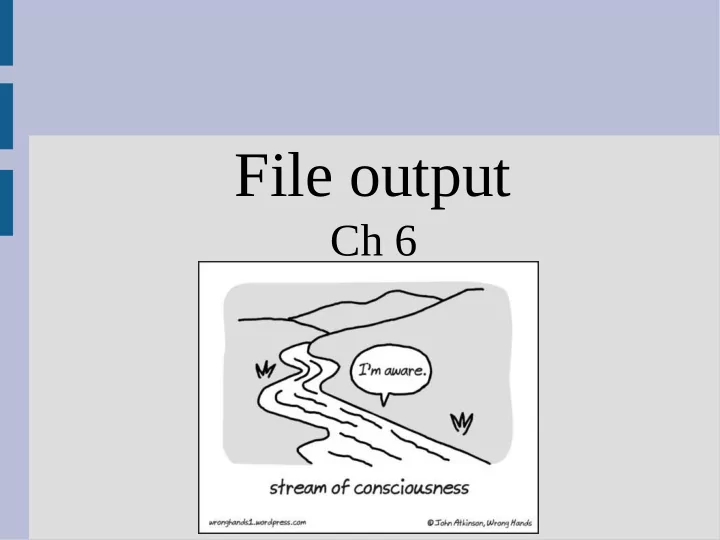

File output Ch 6
Download vs stream
Streams A “stream” is information flow that is immediately processed For example: Streaming video is watch as data arrives Downloading video stores it for later For file input/output (file I/O), we will have to create a stream between file and code
Data persistence The temperature decay problem from last lab had multiple inputs (annoying to re-enter) What if you had a large amount to input to your program? 100 inputs? 1,000,000 data points for predicting weather?
Data persistence Files are also nice, as you can look them up at a later time After your program output ends, the text disappears (unless you re-run it) Files stay on your computer forever (until comp dies)
“Opening” a file File output is very similar to terminal output, except we have to open and close files To create a stream between a variable name and file name: Variable name Type File name
“Opening” a file Sometime you cannot open a file (don't have permission) You can check if the file actually opened by calling fail() (returns true if did NOT open): exit() in <cstdlib>, causes program to terminate
Writing to a file After you have opened a file (stream), you can then write to it This is done in an almost as cout, except you use the your variable name for the file Terminal: File:
Writing to a file Before: cin cout
Writing to a file After: cin cout out (ofstream)
File output imports To use ofstream type, you need to include <fstream> This gives you ofstream (output file stream) and ifstream (input file stream), which we will see next (See: helloWorldFile.cpp)
Closing a file Once we are done writing to a file, we should close the stream This is an extremely complicated process: Variable name If you don't close your stream, something might be left in the buffer
Closing a file Make sure I own... Remove this line (See: needClose.cpp)
Where did this file go? The default “path” for a file is where your cpp file is located You can specify the path when you open the file: You can also use relation operations:
Appending to files What happens if I run HelloWorldFile multiple times? Open file and override: Open file and append: (See: helloWorldFileAppend.cpp)
File writing overview - You need to open a file before writing to it - You should close the file when you are done - You can either override or append to files - Use .fail() to see if file actually opened - You cannot go backwards and “replace” or “undo” - You cannot “preppend” to a file (must either append from end or override)
Caution! Be careful about writing an infinite loop while outputting to a file You will very quickly run out of hard drive space If you think it is stuck in an infinite loop, press ctrl+c to kill the program (from the window) (see: nomNomHD.cpp) https://www.youtube.com/watch?v=_95I_1rZiIs
Recommend
More recommend